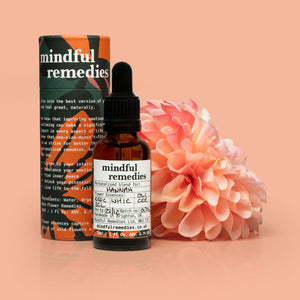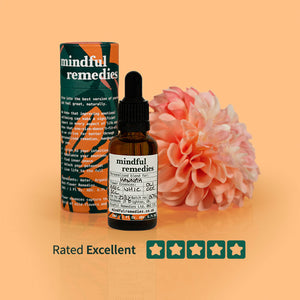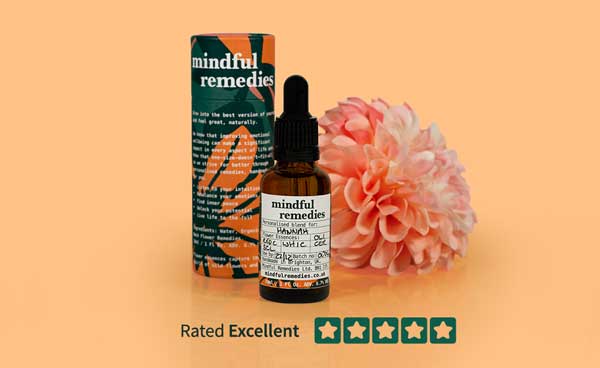your basket
- choosing a selection results in a full page refresh

Do you ever feel like you're struggling to keep your energy balanced? Maybe you feel overwhelmed by stress or anxiety, or you find yourself feeling sad or depressed more often than not. If so, Bach Flower Therapy may be able to help! This natural healing system uses the power of flowers to restore balance and harmony in your energy field. In this article, we will discuss how Bach Flower Therapy works and how you can use flower remedies to heal and improve your overall well-being. We'll also talk about the benefits of Bach flower therapy and how to choose the right flowers for your needs. So if you're interested in learning more about this natural healing system, keep reading!
Bach Flower Therapy is a form of alternative medicine or natural remedy that uses flower essences to treat various psychological and emotional conditions. The therapy was developed by British physician Edward Bach in the 1930s, and it is based on the belief that negative emotions can cause physical illness.
There are 38 different Bach Flower remedies, each of which is designed to address a specific emotion. Many people know of Rescue Remedy which is a combination blend of five flower remedies and is used for emergency situations to counter balance trauma and revive someone. Not many people know that there are actually 38 different remedies and that they can help with a range of different emotional issues such as anxiety, depression, motivation, focus, purpose, exhaustion and much more. Bach Flower Therapy works well in conjunction with other forms of treatment, such as counselling.

Many people initially discover flower remedies when in a moment of crisis or if they're going through a particularly tough time, for example a long illness, menopause, managing the emotions of being a new mum or going through grief. Some people may also choose to take flower essences as a preventative measure, in order to maintain emotional balance.
The remedies are completely natural, safe, gentle and can be used for all ages and alongside existing medication. Similarly to homeopathy, they are a form of energy healing with each remedy taking on the energetic imprint of the flower during the making process whether flowers are either boiled or left in the sun in water.
Dr Bach wanted the system to be a simple system of self help, where everyone could support their emotions and general wellbeing with the use of these remedies. Although 38 may seem overwhelming, they do cover all the emotional states one may encounter. The 38 different flower remedies which have been categorised into seven different groups:
When creating the individual flower remedies, Dr Bach created them in stages, with his first publication called The 12 Healers in 1932.

Twelve Healers
The Twelve Healers are often seen as the fundamental flower remedies that are most associated with personality types. They refer to who we are as a person deep down, rather than passing moods. You may feel that a number resonate but there is usually one which is your true type remedy. It's often useful to think about how you react when something negative happens. This remedy would often be one that you might use ongoing. Here's the original list of the twelve healers and their descriptions:
Agrimony - you hide your worries behind a brave face
Centaury - you are kind but can give your life to serving others
Cerato - you don't trust your judgement and can be easily led astray
Chicory - you can be selfish or possessive in love
Clematis - you are a daydreamer, absent minded
Gentian - you are despondent or pessimistic
Impatiens - you can be easily irritated if things aren't done in a hurry
Mimulus - you are shy and fearful
Rock Rose - you experience sheer terror or panic
Scleranthus - you struggle to make decisions and have an inner restlessness
Vervain - you are opinionated, enthusiastic and stressed
Water Violet - you are aloof, solitary and proud
Seven Helpers
In 1934, Dr Bach added the Seven Helpers which were said to be supportive for more long term states or chronic conditions of the personality. These long term states may obscure a person's true personality or identifying which of the twelve Healers group is the person's true character. The seven helpers are:
Gorse - you feel hopeless and depressed
Heather - you are self-centred and wanting to talk about yourself a lot
Oak - you are overworked, yet persevere not allowing yourself to help
Olive - you are physically exhausted
Rock Water - you are overly perfectionist
Vine - you are bossy and domineering
Wild Oat - you lack direction or purpose in life
Second Nineteen
In 1935 Dr Bach added the Second Nineteen which are more focused on passing moods and our emotional responses to immediate issues. With obstacles in our way, it is important that we develop greater inner strength and fortitude. This will allow us to bring out the best qualities of ourselves when faced with challenges or barriers on a daily basis. The second nineteen include:
Aspen - you have anxiety for no known reason, a general sense of uneasiness
Beech - you are intolerant and judgemental
Cherry Plum - you feel like you're about to lose control
Chestnut Bud - you're unable to gain sufficient insight or wisdom from experience and repeat the same mistakes
Crab Apple - you dislike yourself and feel the need to clean yourself
Elm - you are overwhelmed by responsibility and pressure
Holly - you are angry at other people
Honeysuckle - you are wistful about the past and can't let go
Hornbeam - you are mentally weary at the thought of a task ahead
Larch - you lack confidence in your abilities
Mustard - you suffer depression that comes and goes for no reason
Pine - you feel guilty and blame themselves
Red Chestnut - you are overly anxious for your loved ones safety
Star of Bethlehem - you are suffering a deep shock or trauma after a negative experience
Sweet Chestnut - you are suffering a deep anguish
Walnut - you are overly sensitive to outside influence and change and can be led astray
White Chestnut - you have an overactive mind with repetitive thoughts
Wild Rose - you are apathetic to life and resigned to your fate
Willow - you feel resentment and are self pitying
When working with the flower remedies we talk about peeling the onion. We work by addressing the outer emotions first - so what emotions are you currently feeling right now? As these outer emotions unfold and become balanced, deeper emotional issues may come to the surface that were being submerged by the outer layer of emotions. A personalised combination bottle of custom Bach flower remedies lasts around 3 weeks and during this time you should have noticed a shift in your emotions. At this point you should review your emotions and decide which remedies are still needed and which you feel have come back into balance.

Bach flower therapy in its truest sense involves working with a Bach flower practitioner who can combine their knowledge of the flower remedy system to select the most appropriate remedies for you as well as providing a supportive ear to listen, empathise and provide an outside perspective on your problems.
Working with Lucy Edwards, Bach flower practitioner BRFP
I love working with clients one-to-one listening to their stories and working together to help move them forward. This is a personal conversation with myself to identify the emotions that you feel are most impacting your life at the moment, your relationships with others and what direction you want your life to take. This will then help us choose the most appropriate mix of Bach flower remedies for you. Many clients comment on the remedy selection that it wouldn't have necessarily been what they would have chosen and that I've provided them with a different way of thinking about their problems. The session is 50 minutes long and I’ll follow up the session by posting your personalised remedy to you. I work mostly providing sessions online via Zoom but also on occasion have clients come to my house in Brighton.
If you're interested in booking a consultation you can do so on the online personal consultation page or if you have any questions, feel free to contact us. If you'd prefer to create your own remedy, you can do so on the personalised flower remedy page.

Since 2021, Lucy Edwards, a qualified Bach Flower Practitioner and the driving force behind Mindful Remedies, has connected with clients across the world. Crafting thousands of personalised remedies, Lucy has supported individuals' emotional wellbeing, shipping remedies to far-flung places like the USA, Thailand, and Australia.
Lucy is readily available for conversations, offering personalised advice to guide you on the path to holistic wellness. It's important to note that she's not only qualified but also registered with the Bach Centre, ensuring that every consultation and remedy adheres to Dr Bach’s original guidelines for expert care and efficacy.
Exclusive pricing 20% off your first subscription order and 5% off all future orders
VIP treatment Receive personalised advice from Lucy, free gifts & 15% off gift vouchers
Easy to manage Edit remedy, change schedule, pause or cancel at any time
Exclusive online workshops Access to workshops focusing on emotional wellbeing, guided by Lucy
Early access to new products Be the first to try out new remedies or wellness products, before anyone else



